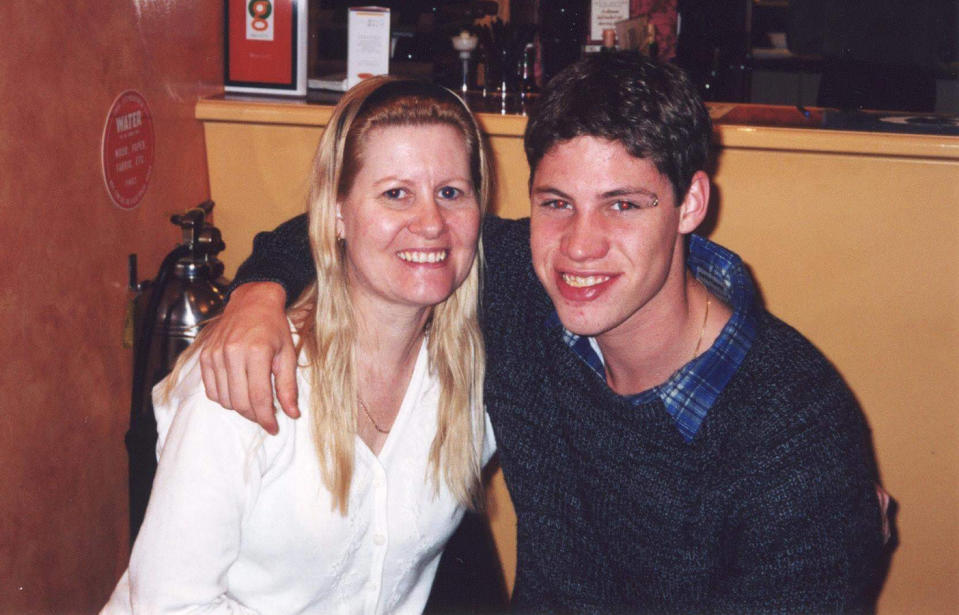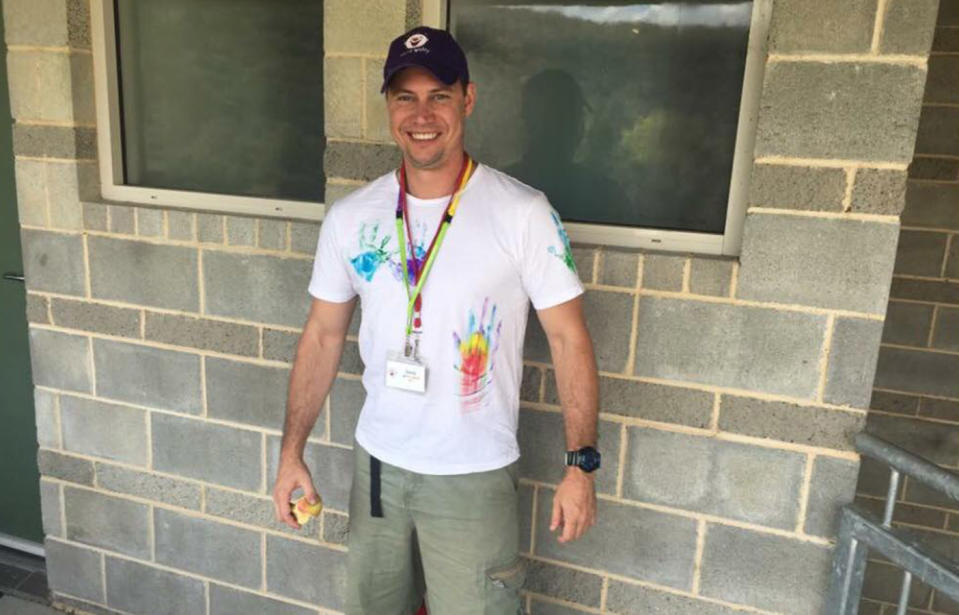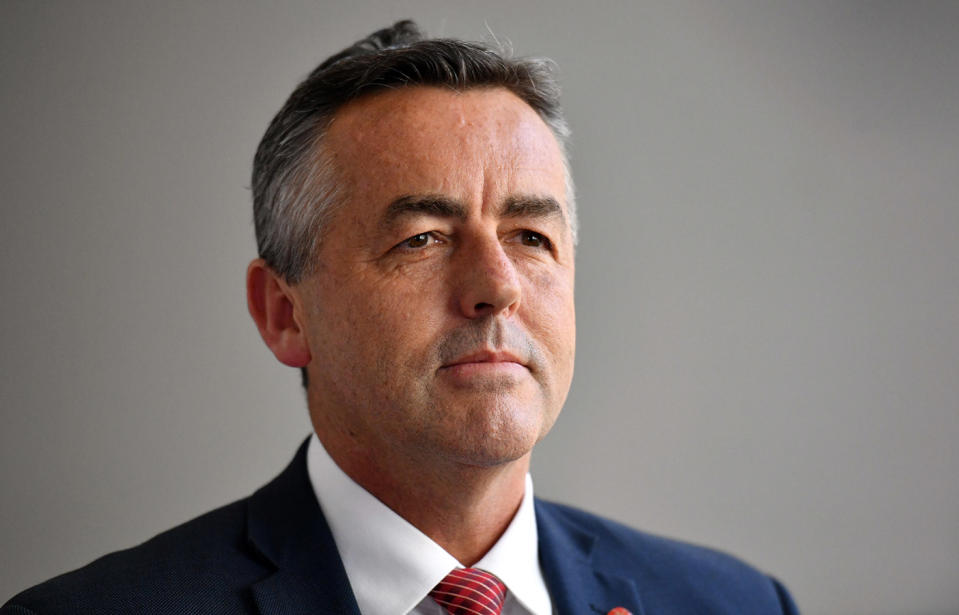'They broke him': Mum of retired Australian Navy officer pushes to end 'veteran suicide crisis'
When police officers showed up on the doorstep of Julie-Anne Finney’s Adelaide home late on February 1, she prayed they were there to arrest her.
She knew the knock on her door meant something tragic had happened to someone she loved – and devastatingly, the mother’s instinct was right.
Her son David, a former Australian Navy sailor, had taken his own life after years of battling with PTSD.
“I knew when [the officer] spoke that my life was going to change,” the 57-year-old told Yahoo News Australia.

The system that ‘failed’ Navy officer David Finney
In 1998, when he was 18-years-old, Mr Finney enlisted in the Royal Australian Navy where he served for the next 20 years.
During that time he tried to take his own life after a string of emotional events at work and in his personal life.
He spent about six months in a psychiatric hospital, but went straight back to work after he was released. He carried on for years until he was eventually discharged in 2018.
When Yahoo News Australia spoke with the 38-year-old retired sailor last September, he was writing a book about his emotional struggles. He hoped sharing his story might break down the taboos around mental health for military personnel and encourage those battling their own inner demons to ask for help.
He also spoke of his plight to “find his place” in the world through volunteering with Camp Quality and as a Big Brother with Menslink.
“These things have both restored some of my faith in humanity and given me back a good portion of my strength,” he told Yahoo News Australia of his volunteer work.
But within five months, the former Royal Australian Navy Petty Officer had lost the fight.

Mum continues son’s story about PTSD
Mr Finney’s mother is now pushing for better mental health support for other vets like her son, so they aren’t pressured to carry on at work unsupported.
“David's story is not over and I will continue to fight for change for all of our veterans. They deserve that, David deserves that,” she said.
“I am devastated and heartbroken, but I want to fight for him. I want to fight for all of them,” she said.
“I didn’t know that he was in with the Department of Veterans’ Affairs (DVA) until after he died. I thought the Australian Defence Force (ADF) would look after their people. I thought he would be okay.”
She said her son “presented well” on the outside, but wasn’t vocal enough about his need for mental health support. Nobody knew the extent of his suffering.
“He had a real passion for living. He wanted to get through it. He wasn’t living an isolated life – he was really trying to get better,” the mother said.
“He really wanted to share his story with other people going through it,” Ms Finney said.

The ADF ‘broke him’
Ms Finney refuses to refer to her son’s condition as PTSD, saying it wasn’t a “disorder”, but rather a “workplace injury”.
“The minute you say you have mental health issues in the ADF you’ve lost your job. They sign you out on a medical discharge with no support. What other employer in Australia can do that?” she asked.
“David loved his career. But they made him. They broke him. They sacked him,” she said.
In late October, three months before his suicide, Mr Finney tried to make an appointment to see a psychologist but was told there was no DVA psychologists available until April.
“I don’t think my son saw a psychologist after that,” she said.
“He desperately wanted to stay alive, but was failed by a broken system.
“This is a national tragedy and something needs to be done about it.”
Push for royal commission into ‘ADF suicide crisis’
Ms Finney is pushing for a royal commission into the "suicide crisis" among Australian veterans. Her Change.org campaign has already achieved support from almost 235,500 people.
She said the official statistics place veteran suicides in the 300s, but that only accounted for those who have died while serving, or who were seeking compensation from the DVA.
It did not account for those who have been discharged without an ongoing case with the DVA.
Late last month she met with Minister for Veterans’ Affairs, Darren Chester, whom she said was “sympathetic” and promised to take her concerns to the Prime Minister.
She is pushing for the Federal Government to make it a priority for serving and retired vets in need of mental health support to receive better access to the help they desperately need.
The Productivity Commission’s report into the June 27 inquiry, A Better Way to Support Veterans, found the current veterans' compensation and rehabilitation system required a fundamental reform.

“It is out-of-date and is not working in the best interest of veterans and their families, or the Australian community,” the report found.
“They have zero idea. When they come up with a new initiative they add a new layer to the problem,” Ms Finney said.
"How many more signatures [on the Change.org petition] does the Minister need?” she asked.
“How many more inquiries is there going to be? And how many more dead veterans does he want before he can launch a royal commission?"
She said there's been "the same rhetoric for 10 years" and every time a veteran takes their own life it was “on the Minister's watch”.
“Every day we wait for a royal commission we are going to have another [veteran suicide] death,” Ms Finney added.
‘The only acceptable number is zero’: Defence Minister
Mr Chester confirmed in a statement to Yahoo News Australia Prime Minister Scott Morrison was open to a royal commission into veteran suicides.
“The Prime Minister has said all options are on the table,” he said.
Speaking generally about suicide, he said it was a “national tragedy” that more than 3000 Australians take their own lives each year, and there was no single solution to “this sad and complex issue”.
“When it comes to veteran suicide, the only acceptable number for me is zero, and the only acceptable number for the Australian people is zero,” he said.
“Australians can be assured that the government is committed to putting veterans and their families first and is working with veterans and their families every day to improve services and support for those who have served in the Australian Defence Force.”
He said veterans were eligible for free treatment for any mental health condition and funding was uncapped.

He added that the July 4 Productivity Commission’s report into Compensation and Rehabilitation of Veterans offered a comprehensive and independent inquiry into supporting veterans and their families, which made 69 recommendations and 26 findings.
“It is a significant report looking at an important and complex system, and will require careful consideration by the Government, as well as the veteran community and other stakeholders,” Mr Chester said.
“We will finalise our response to the report in conjunction with the recent Joint Standing Committee on Foreign Affairs, Defence and Trade Inquiry into transition from the Australian Defence Force and the Veterans’ Advocacy and Support Scoping Study, which have also considered in detail the best ways of supporting veterans and their families.”
Speaking of suicide prevention generally, the minister said Mr Morrison was taking a “concerted action” including the appointment of Christine Morgan as Australia’s National Suicide Prevention Adviser.
Support services for Australian veterans
If you are concerned about the mental health of yourself or a loved one, seek support and information by calling:
VVCS or Veterans Line After-Hours Crisis Counselling: 1800 011 046 (whilst overseas: +61 8 8241 4546)
Defence All Hours Support Line: 1800 628 036
Defence Family Helpline: 1800 624 608
Lifeline: 13 11 14
beyondblue: 1300 224 636
MensLine: 1300 789 978
Veterans and Veterans Families Counselling Service: 1800 011 046
Do you have a story tip? Email: newsroomau@yahoonews.com.
You can also follow us on Facebook, download the Yahoo News app from iTunes or Google Play and stay up to date with the latest news with Yahoo’s daily newsletter. Sign up here.


